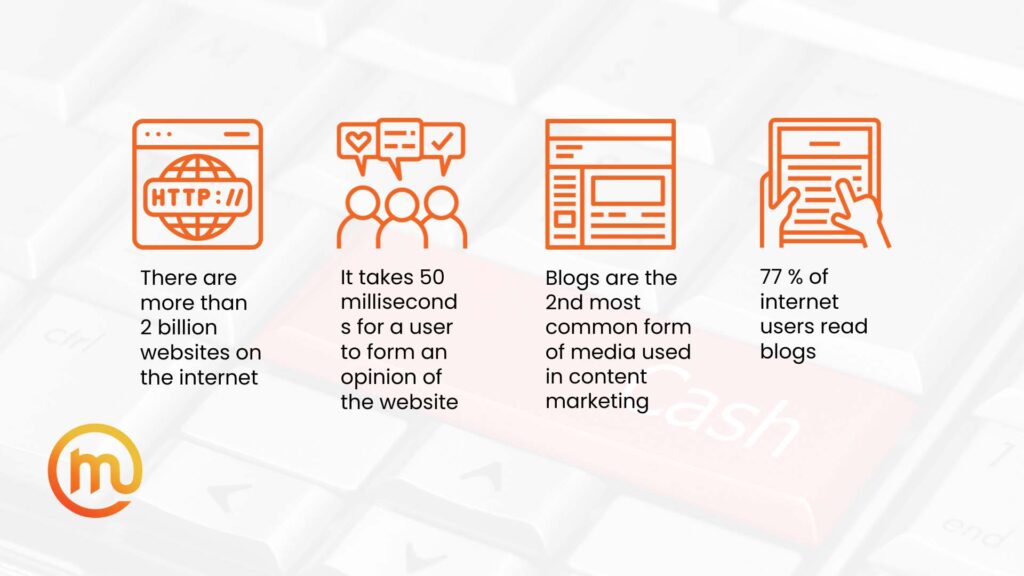Did you know that 77% of internet users are blog readers? That’s why, as a business owner, you should take advantage of the power SEO content has. But how to detect AI-written content in the age of rising artificial intelligence? If you want to know if your content marketing agency creates genuine articles, let’s dive into everything that separates human from AI content.
Detecting AI-written content involves recognizing telltale signs like unusual vocabulary choices and a lack of emotional depth. Authentic, human-written content offers genuine connection, while AI-generated text may display inconsistencies in tone or rely too heavily on repetitive facts. Always prioritize the human touch in your digital marketing content for true authenticity.
Why Is It Important to Have Human-Written Content on Your Website?
Content is about more than just filling web pages. It’s about building genuine connections. And the one written by writers brings authenticity, understanding, and emotion – a touch AI simply can’t replicate.
As a business owner, you might wonder why is content marketing important for your enterprise. Know that it drives organic traffic, positions your brand as an industry leader, and boosts conversion rates. But its essence lies in stories, emotions, and genuine interactions only a real person can offer.
That’s why, to truly harness the power and benefits of content marketing, human-crafted content is not just preferred it’s essential. That being said, hiring a digital marketing agency to help you create articles is the way to go if you want to get ahead of your competitors.

How to Detect AI Written Content – Unusual Vocabulary Choices Are One of the First Signs
More than 50% of businesses invest in publishing content every day. This information shows that in the digital age, content is king. So, ensuring authenticity is paramount. This is especially important if you’re a business owner looking to communicate effectively with your potential clients. One of the first telltale signs that a piece might be generated by AI is its use of unusual writing choices.
As a business owner, you’re looking to resonate, to communicate, and to engage. You want articles that speak your customers’ language, not something that leaves them reaching for a dictionary. That’s why authentic content writers prioritize clarity, relevance, and reader-friendliness. So, the next time you’re vetting potential articles for your business, be wary of those pieces that feel a tad too “loquacious” or out of touch—it might just be a robot trying to sound smart!
Why Does AI Opt for Odd Words?
When AI is trained, it consumes huge amounts of data. This leads the AI to pick up on words or phrases that might not be the best fit for certain contexts. The result? The use of uncommon words where simpler ones would do or even entirely out-of-context terms that don’t fit the narrative.
How to Detect if Content Is Written by AI – Real-Life Examples to Illustrate the Point
Imagine reading a blog about digital marketing tips for small businesses, and suddenly, you stumble upon a sentence like: “Businesses should endeavor to ameliorate their online presence by leveraging propitious algorithms.” A writer would more likely say: “Businesses should improve their online presence by using helpful digital strategies.”

Lack of Personal Touch or Emotion
Every brand has a story, and every story carries emotion. It’s this emotion that allows businesses to connect deeply with their audience and potential clients, fostering trust and loyalty. Here’s where AI falls short.
While it can analyze patterns and data, it lacks the ability to feel. Telling a tale of a family-run business, its trials, challenges, and eventual triumph is something only a human can do believably. A creator taps into emotions such as love, ambition, and struggle to weave a compelling narrative. While AI may merely list events chronologically, lacking depth and empathy.

Overuse of Facts, Lack of Nuance
Businesses don’t just seek to inform anymore, they aim to engage and inspire, or else they will lose clients. This is where the AI’s approach can become a double-edged sword. Their algorithms, when generating text, tend to lean heavily on facts. They pull from many databases, generating articles that are factually rich but often miss the mark on nuance.
The difference between humans and AI is subtlety. A writer infuses the article with passion, perspective, and a deeper understanding, transforming facts into a compelling narrative.

Inconsistent Tone or Style
Consistency is key in the realm of creation, particularly when aiming to establish a distinct brand voice. This consistent voice is essential for audience trust. However, AI, despite its many advancements, often falters when maintaining a uniform tone or style.
This happens because AI models learn from a diverse range of sources. This diversity, while beneficial in comprehending different writing styles, sometimes leads to notable shifts within a single piece.
For instance, an article might begin in a conversational tone, suddenly turn into a more formal territory, and conclude with a sudden burst of enthusiasm. Such inconsistency can disrupt the reader’s flow and erode trust in the brand’s voice.

Repetitive Phrases or Ideas
Fresh and unique content reigns supreme. It’s a crucial element for SEO success and audience engagement. But one area where AI-generated articles can trip up is their tendency to overuse specific phrases or repeatedly circle back to the same ideas.
Why does this happen? AI models operate by recognizing patterns in different datasets. Sometimes, if a particular phrase or idea is frequent in its training data, the AI may overemphasize its importance, leading to repetition.
How to Detect Content Written by AI – Example Comparison of Repetitive Phrases or Ideas
For brands striving to stand out in the online world, repetition can be the downfall. It’s crucial to offer value with every sentence. That’s why, for top-notch, SEO-optimized digital marketing content, a writer’s creativity is irreplaceable.
Here is an example of AI-generated text: “Digital marketing is essential for businesses. With digital marketing, businesses can improve online visibility. It’s crucial to note that online visibility is mainly achieved through digital marketing strategies.“
As you can see, AI keeps repeating keywords like “digital marketing” and “online visibility,” spamming readers and making the text unnecessarily long and boring.

Over-Complicated Sentences
How would you feel trying to read something clearly written to be too complicated? If you want to have articles on your website that attract customers, it needs to be simple and easy to understand. That’s where AI-generated texts miss the mark. As we said, the AI is trained on a huge amount of data, and sometimes it stitches together information in ways that can be hard to follow.
In the world of digital marketing, where every click and second of attention counts, it’s essential to communicate messages efficiently. Over-complicated sentences can deter readers, making clear, SEO-optimized content necessary for success.

Responses That Don’t Exactly Fit the Context
In the intricate dance of Q&A formats, particularly common in digital marketing tools like chatbots or customer support AI, precision is a must. However, even the most advanced AI systems can sometimes offer responses that don’t align perfectly with the given context.
The issue? AI processes queries based on patterns and algorithms without genuine comprehension. This means multi-layered questions might receive answers that, while related, miss the main point of the query.
For example, let’s say that the user query is – How can I integrate SEO tactics with my ongoing content marketing strategy for better user engagement?
The AI-generated response would be: “SEO tactics improve website rankings. Implementing keyword research and optimizing your site will enhance visibility.”
While the writer might provide insightful responses such as: “To seamlessly integrate SEO with your content marketing, start by understanding your audience’s search intent. Then, craft content that addresses their needs while naturally incorporating relevant keywords. This approach not only boosts rankings but also fosters genuine user engagement.”
The AI’s response, while accurate, glosses over the integration aspect, focusing instead on basic SEO benefits. The writer’s answer, meanwhile, provides a more tailored and context-aware solution.

When You Hire a Trustworthy Content Writing Agency All Your Articles Will Be Human-Written
Remember, navigating the world of digital content can be pretty tricky, especially when it’s crucial to maintain authenticity and a genuine touch. It’s not just about filling your website with keywords—it’s about telling your brand’s story, resonating with the audience, and building trust.
If you’re seeking top-notch, SEO-optimized content that truly reflects your brand, partner up with Made Online. We are a content creation agency that understands the intricacies of digital marketing and prioritizes creativity over automation. Let us help you stand out in the huge digital world. Contact Made Online and amplify your brand’s voice today!
Frequently Asked Questions About Human vs. Robot Content Creation
Is All AI-generated Content Easy to Spot?
Not always. While some AI-generated text might have obvious clues, advancements in natural language processing have made it challenging. However, keen dedicated readers can notice a lack of authenticity in digital writing or a missing genuine touch. That’s why a trustworthy content strategy agency will use SEO writers to create articles.
How Reliable Are AI Content Detectors?
AI content detectors are becoming increasingly sophisticated. However, they are still prone to mistakes, and a study shows that they are less than 30% of the time accurate when it comes to detecting AI-generated text.
Can AI-generated Content Have Any Real Value?
Yes, AI-generated content can offer value, especially in data-driven tasks. But when it comes to the question of genuine vs. machine-generated blogs, the human touch brings authenticity, emotion, and depth, which AI might not always replicate convincingly.

